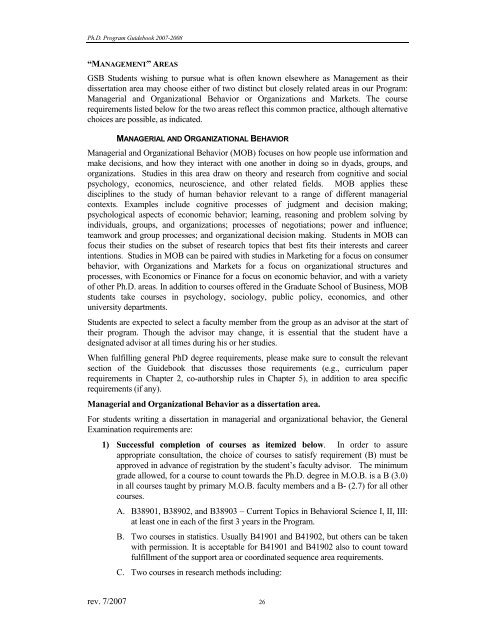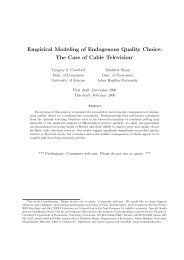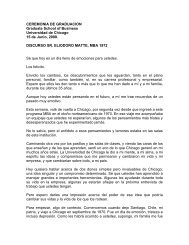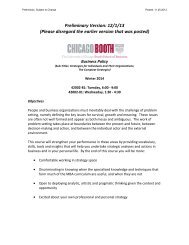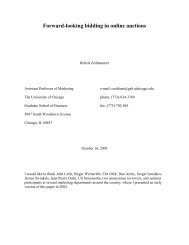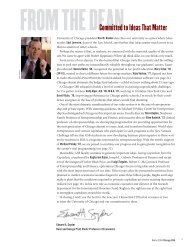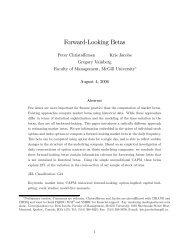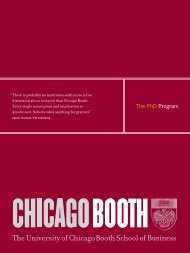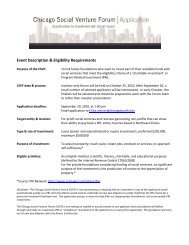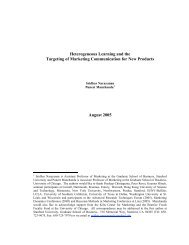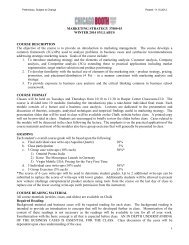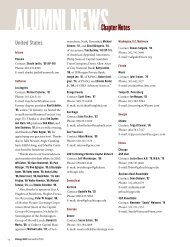Ph.D. Program Guidebook - The University of Chicago Booth School ...
Ph.D. Program Guidebook - The University of Chicago Booth School ...
Ph.D. Program Guidebook - The University of Chicago Booth School ...
You also want an ePaper? Increase the reach of your titles
YUMPU automatically turns print PDFs into web optimized ePapers that Google loves.
<strong>Ph</strong>.D. <strong>Program</strong> <strong>Guidebook</strong> 2007-2008<br />
“MANAGEMENT” AREAS<br />
GSB Students wishing to pursue what is <strong>of</strong>ten known elsewhere as Management as their<br />
dissertation area may choose either <strong>of</strong> two distinct but closely related areas in our <strong>Program</strong>:<br />
Managerial and Organizational Behavior or Organizations and Markets. <strong>The</strong> course<br />
requirements listed below for the two areas reflect this common practice, although alternative<br />
choices are possible, as indicated.<br />
MANAGERIAL AND ORGANIZATIONAL BEHAVIOR<br />
Managerial and Organizational Behavior (MOB) focuses on how people use information and<br />
make decisions, and how they interact with one another in doing so in dyads, groups, and<br />
organizations. Studies in this area draw on theory and research from cognitive and social<br />
psychology, economics, neuroscience, and other related fields. MOB applies these<br />
disciplines to the study <strong>of</strong> human behavior relevant to a range <strong>of</strong> different managerial<br />
contexts. Examples include cognitive processes <strong>of</strong> judgment and decision making;<br />
psychological aspects <strong>of</strong> economic behavior; learning, reasoning and problem solving by<br />
individuals, groups, and organizations; processes <strong>of</strong> negotiations; power and influence;<br />
teamwork and group processes; and organizational decision making. Students in MOB can<br />
focus their studies on the subset <strong>of</strong> research topics that best fits their interests and career<br />
intentions. Studies in MOB can be paired with studies in Marketing for a focus on consumer<br />
behavior, with Organizations and Markets for a focus on organizational structures and<br />
processes, with Economics or Finance for a focus on economic behavior, and with a variety<br />
<strong>of</strong> other <strong>Ph</strong>.D. areas. In addition to courses <strong>of</strong>fered in the Graduate <strong>School</strong> <strong>of</strong> Business, MOB<br />
students take courses in psychology, sociology, public policy, economics, and other<br />
university departments.<br />
Students are expected to select a faculty member from the group as an advisor at the start <strong>of</strong><br />
their program. Though the advisor may change, it is essential that the student have a<br />
designated advisor at all times during his or her studies.<br />
When fulfilling general <strong>Ph</strong>D degree requirements, please make sure to consult the relevant<br />
section <strong>of</strong> the <strong>Guidebook</strong> that discusses those requirements (e.g., curriculum paper<br />
requirements in Chapter 2, co-authorship rules in Chapter 5), in addition to area specific<br />
requirements (if any).<br />
Managerial and Organizational Behavior as a dissertation area.<br />
For students writing a dissertation in managerial and organizational behavior, the General<br />
Examination requirements are:<br />
1) Successful completion <strong>of</strong> courses as itemized below. In order to assure<br />
appropriate consultation, the choice <strong>of</strong> courses to satisfy requirement (B) must be<br />
approved in advance <strong>of</strong> registration by the student’s faculty advisor. <strong>The</strong> minimum<br />
grade allowed, for a course to count towards the <strong>Ph</strong>.D. degree in M.O.B. is a B (3.0)<br />
in all courses taught by primary M.O.B. faculty members and a B- (2.7) for all other<br />
courses.<br />
A. B38901, B38902, and B38903 – Current Topics in Behavioral Science I, II, III:<br />
at least one in each <strong>of</strong> the first 3 years in the <strong>Program</strong>.<br />
B. Two courses in statistics. Usually B41901 and B41902, but others can be taken<br />
with permission. It is acceptable for B41901 and B41902 also to count toward<br />
fulfillment <strong>of</strong> the support area or coordinated sequence area requirements.<br />
C. Two courses in research methods including:<br />
rev. 7/2007 26


